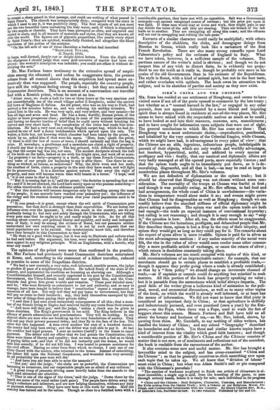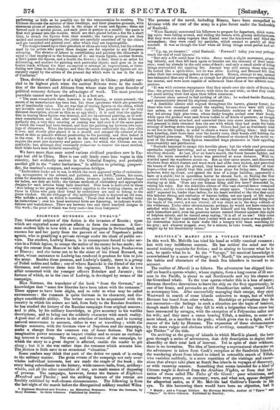SIRE'S CHINA AND THE CHINESE. * ME. Sum has resided at
our settlement of Hongkong, and seems to have visited some if not all of the ports opened to commerce by the late treaty ; but whether as a " counsel learned in the law," or engaged in any other pursuit, does not appear. Animated by a more liberal and inquiring spirit than is always found in residents at out-of-the-way places, Mr. Sirr seems to have mixed with the respectable natives as much as he could ; to have looked at and into their manners, customs, arts, manufactures ; and to have sought for information upon subjects that were out of sight. The general conclusions to which Mr. Sirr has come are these : That Hongkong was a most unfortunate choice,—unproductive, pe.stilential, and inhabited by the very outcasts of the Celestial Empire, while Chusan, which we might have had, is advantageous in every point of view : that the Chinese are an able, ingenious, industrious people, indefatigable in pursuit of their objects, which arc only wealth and worldly advantages, but insolent, hypocritical, artful, and addicted to every species of profligacy and vice : finally, that our nautical and diplomatic affairs are very badly managed at all the opened ports, more especially Canton ; and that the opium trade ought to be immediately put down, as it is de- moralizing, disgraceful, and all that is bad,—as may be read at large in numberless places throughout Mr. Sires volumes.
We are not defenders of diplomatists or the opium trade ; but it should be observed that Hongkong was not chosen without some con- sideration. The mortality of the troops at Chusan was fearful at first ; and though it was probably owing, as Mr. Sirr affirms, to bad food and bad arrangements, the whole coast of China is unwholesome—the varia- tions in temperature would alone make it so; and events might prove that Chusan had its disagreeables as well as Hongkong ; though we can readily believe that the starched stiffness of official diplomacy might be above asking a question. The opium war and the opium trade are both bad enough—the trade an especial instance of conventional hypocrisy; but railing is not reasoning ; and though it is easy enough to say "stop it," the question is how. After all, too, the effects must be exaggerated. If the Chinese are the luxurious, profligate, and debauched people that Mr. Sirr describes them, opium is but a drop in the cup of their iniquity, and opium they would get as long as they could pay for it. The remarks about the export of sycee silver is mere twaddle. Opium is paid for in silver as the most advantageous medium : if any undue scarcity of the metal were felt, the rise in the value of silver would soon render some other commo- dity a more profitable article of exchange, or cause the return of silver ; which return is doubtless constantly taking place. Mr. Sirr's volumes are too much occupied with topics of this kind, or with recommendations of an impracticable nature : for example, that our merchants should go to certain places to establish a profitable trade,— though it appears they prefer going where a trade is already established ; or that by a "firm policy" we should change an inveterate channel of trade,—as if captains or consuls could do anything but mischief in such matters. All this portion of the book has properly speaking no value ; but it is passable from the earnestness which belief always imparts.. The good faith of the writer gives a ludicrous kind of animation to the poli- tical, moral, and economical discussions, as well as to many other topics of the book, on which the world is already well informed, or at least has the means of information. We did not want to know that filial piety is considered an important duty in China ; or that agriculture is skilfully and industriously pursued, and even practised (once a year) by the Em- peror,—as the Pope, when there was a Pope, used to wash the feet of beggars about this season. Messrs. Fortune and Ball have told us all about the botany and business of tea,—as Mr. Sirr, indeed, shows, by quoting from them. Mr. Gutzlaffe, to say nothing of olden writers, has handled the history of China ; and any school " Geography " described its boundaries and so forth. Yet these and similar known topics have a kind of interest from the vitality which good faith bestows ; and though a considerable portion of Mr. Sires China and the Chinese consists of matter that is not new, or of sentiments and reflections not of the soundest, the book is readable from the earnestness of the author.
It also contains some new and useful matter. Mr. Sirr has brought a lawyerlike mind to the subject, and has cross-examined "China and the Chinese"; so that he generally contrives to elicit something new upon each topic that he takes up. We all knew that "division of labour " must exist in China; but what was Adam Smith's nail or pin compared with the Chinaman's porcelain!
"The number of workmen employed to finish one article of chinaware is al- most incredible; a single cup is said, from the kneeding of the paste, to pass through seventy hands, before it is ready for sale; each individual in its progress • China and the Chinese : their Religion, Character, Customs, and Manufactures ; the Evils arising from the Opium Trade ; with a Glance at our Religious, Moral, Po- litical, and Commercial Intercourse with the Country. By Henry Charles Sim M.A., of LIncobes Inn, Barrister-at-law. In two volumes. Published by Orr and Co.
performing as little as he possibly can for the remuneration he receives. The Chinese decorate the exterior of their dwellings, and their pleasure-grounds, with enormous pieces of porcelain, both in the shape of vases and figures; these are formed each in several pieces, and each piece or portion in a mould: the paste is first well pressed into the moulds, which are then placed before a fire for a short time to detach the figures from their moulds; the various portions are then united and cemented together, the joints are carefully smoothed off by the chisel, and are varnished and painted over, after which they are imperceptible.
"The designs traced upon their porcelain or china are very inferior, but the colours used by the artists who paint these designs are far superior to any European colouring. The division of labour in embellishing and painting the chinaware is equal to that employed in the formation of it: one traces figures, another flowers, a third paints the figures, and a fourth the flowers: in fact, there is an artist for delineating, and another for painting each particular object; each goes on in one beaten track, without the least conception or attempt at improvement, or intro- ducing new Ideas in their designs; and thus the same designs and figures are ac- curately copied by the artists of the present day which were in use in the days of Cmfucius."
Thus, division of labour is of a high antiquity in China; probably car- ried to its highest pitch when the ancient Britons were in the condi- tion of the hunters and Africans from whose state the great founder of political economy deduces the advantages of work. The most precious porcelain cannot now be produced ; it is a lost art.
The most remarkable ware however, is the Kissing, or azure-pressed ; the secret of its manufacture has been lost, but those specimens which are preserved are of inestimable value. The art was that of tracing figures on the china, which are invisible until the vessel is filled with liquid. The porcelain is of the very thinnest description, almost as thin as an egg-shell ; it is said that the applica- tion in tracing these figures was internal, and not by external painting, as in ordi- nary manufacture, and that after such tracing was made, and when it became perfectly dry, a very thin covering or coating was laid over it of the same paste of which the vessel had been formed, and thus the painting lay between two coat- ings of chinaware. When the internal coating became sufficiently dry, they oiled it over, and shortly after placed it in a mould, and scraped the exterior of the vessel as thin as yossible without penetrating to the painting, and then baked it in the oven. It it evident that if such be the mode which was adopted it would require the most nice dexterity and patient care, for which the Chinese are re- markable: but, although they constantly endeavour to recover the exact method, their trials have been hitherto unavailing."
We have more than once noted various civilized practices new in Eu- rope but old in China. Here is one only lately come into vogue in this country, but evidently ancient in the Celestial Empire, and probably another gift to the "outer barbarians," in addition to printing, gunpow- der, the mariner's compass, and suspension -bridges.
"Embroidery-books are in use, in which the most approved styles of embroider- ing, arrangement of the colours, and patterns, are set forth ,.purses, fan-cases, robes for mandarins and the wealthy, skirts, trousers, jackets, and tobacco-bags for ladies, are duly set forth; the various methods of embroidery and appropriate designs for each articles being fully described. This book is dedicated to those who belong to the green window,'—which signifies to the working classes, as all those in China who gain their bread by embroidery are said to belong to the green window. On the titlepage of this embroidery-book is depicted an old man, who unfolds a scroll, on which is inscribed, Those that would be wealthy must be industrious '; over his head nocturnal birds are fluttering, to indicate watch- fulness and wakefulness. There are between two and three hundred designs in this work ; the price of which was forty cash—less than fourpence."



























 Previous page
Previous page